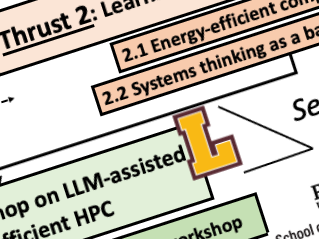New NSF grant: Exploring The Risks and Rewards of Large Language Models in Enabling Energy-Efficient Data Center Software Infrastructure

Sure, here's a blog post in Hemingway style:
I’m thrilled to announce that our project (with yours truly as PI) has received an EAGER award from the National Science Foundation’s Clean Energy Technology initiative. This collaboration with Jamie Davis and Yung-Hsiang Lu at Purdue University and Konstantin Läufer at Loyola University Chicago aims to tackle a pressing issue: the growing energy consumption of data centers.
Data centers currently consume about 2% of the U.S.'s energy, and this number is set to rise. Our goal is simple but ambitious: make data centers–and the software running on them--more energy-efficient. We’re leveraging Large Language Models (LLMs) to optimize software energy use. By optimizing software to use less energy, we can cut down the overall energy footprint of data centers.
But our project doesn't stop at research. We’re also focused on education. We’re developing new educational materials on energy efficiency, which will be available online and presented at a workshop in the second year of the project.
Our approach is twofold:
- Energy-Efficient Software: We’re using LLMs to create smarter, energy-saving software solutions for data centers. These models learn and adapt, providing real-time feedback to improve efficiency.
- Educational Materials: We’re building a new framework for teaching energy efficiency, emphasizing systems thinking. This holistic approach helps students understand the broader impact of energy use and find innovative solutions.
Our project is structured around three main thrusts:
- Measuring the impact of LLMs on energy-efficient programming.
- Creating and sharing new educational materials.
- Hosting a workshop to disseminate our findings.
If successful, this project could revolutionize energy-aware software engineering and education. We’re excited to see the positive changes it can bring to both the tech industry and the environment.
For more information about our NSF grant, see https://www.nsf.gov/awardsearch/showAward?AWD_ID=2343595.
Stay tuned for more updates as we progress on this exciting journey!
Feel free to make any adjustments or add personal touches as you see fit!